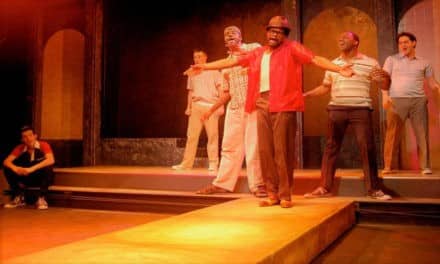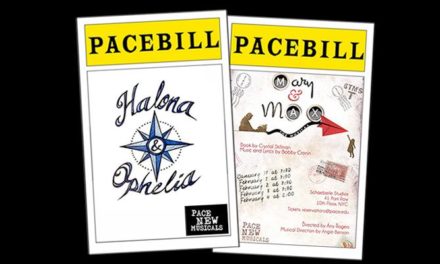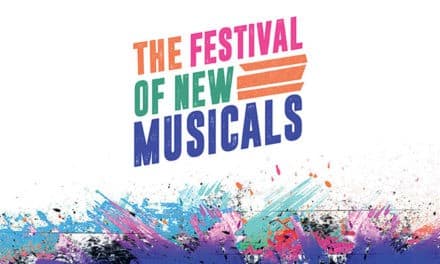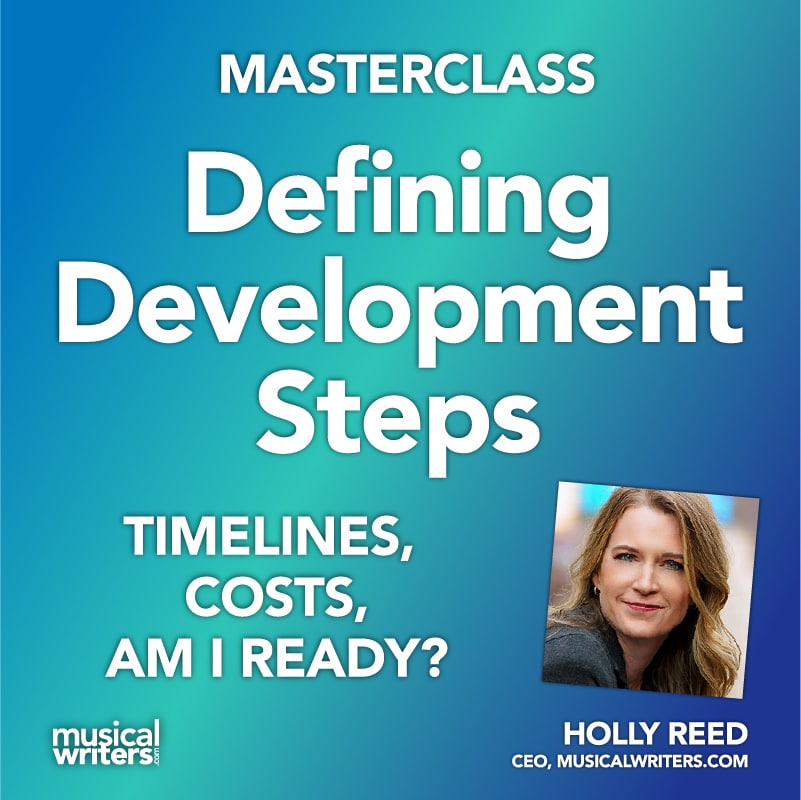
Gregory Allen, prior Artistic Director of New Jersey’s 4th Wall Musical Theatre
“You’re never going to see us doing Annie,” stresses Gregory Allen, previous Artistic Director of New Jersey’s 4th Wall Musical Theatre. “I can go to see The Wizard of Oz or Oklahoma and really enjoy them. I was involved with 4th Wall because of what we offered our audiences: something they’re not going to see anywhere else.”
The 4th Wall Musical Theatre is one of a handful of “arts partners” that occupy The Westminster Arts Center on the campus of Bloomfield College in Bloomfield, NJ. The community-based theater group, which is currently headed by Kate Swan and Executive Director Gwen Ricks-Spencer, performs in the Robert Van Fossan Theatre, a 300 seat converted church with stadium seating and a semi-circular thrust stage.
4th Wall mounts three or more musicals per season. Their main stage shows typically run for three weekends, Friday through Sunday, at various times throughout the year. The company’s physical production values tend to be spare but tasteful, with a few well-chosen effects and scenic elements – like the clever use of rolling metal scaffolding to suggest the prison settings in Kiss of the Spider Woman. The shows are cast with a mix of local actors and moonlighting professionals, who receive a stipend for their involvement.
Lesser Known and Seldom Seen
The folks at the 4th Wall like to characterize the musicals they produce as lesser known and seldom seen (although Allen kids that his Board of Directors had occasionally suggested that he consider doing “something people have heard of.”) 4th Wall also dabbled with presenting unfamiliar titles by very familiar writers. For example, rather than produce Kander & Ebb’s Cabaret or Chicago, they chose The Rink. And Schmidt and Jones’ rarely staged Philemon was performed in lieu of The Fantastiks. “It allows our audiences to experience something they’ve never seen and don’t know as much about,” stated Allen.
The logical next step for 4th Wall was to begin presenting musicals that nobody had heard of – in other words, brand new works. So, in 2007 the theater established their Musicals In Development, or M.I.D., series. As the acronym would suggest, the resulting production fell midway between a reading and a production: a barebones staging with a 7:30 pm curtain and a talk back session after each of the performances. “It was a different way to expand our mission,” Allen explains. “We started with a musical that I had written, Invisible Fences, which deals with racial tensions in the South during the sixties. We did it for three nights during Black History Month and we were shocked by the turnout! We had people show up that had never come to a 4th Wall show.”
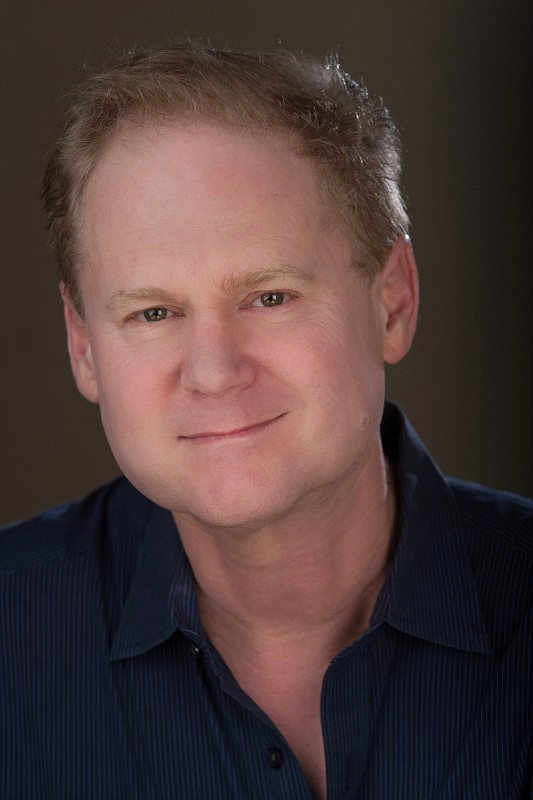
Writer Charles Bloom
Emboldened by their initial success, 4th Wall solicited submissions of new works in the fall of the same year, in the hope of finding a piece they could stage the following January. Among the scripts that arrived was Charles Bloom’s Heaven Knows. “Before knowing anything about the organization, the geography appealed to me,” Bloom says. “The show was at the stage of its development where I wanted it to be presented by a nearby theatre company, but I didn’t yet want it seen in New York.”
Charles Bloom, whose show Heaven Knows was invited for a production, was impressed level of commitment that he sensed from everyone involved with 4th Wall. “When something is in its early stages, it needs people whom the writer feels truly care about it more than just about anything else. From the start, it was clear that the primary objective of 4th Wall was to nurture and improve the show by providing it residency in that rarely-visited level of presentation: not a formal production with lots of “bells and whistles,” but not a dreary “stools in a semi-circle” sort of reading, either,” he explains. And, as far as Bloom was concerned, the M.I.D. staging was exactly what Heaven Knows needed. “A good dinner tastes no better on an expensive tablecloth,” he adds.
Though he was only able to attend a few rehearsals, Bloom worked closely with the director, Gwen Ricks-Spencer, on revisions. “I thought there would be a smattering of changes but, once I knew the rewards the rewrites would bring, I worked non-stop,” Bloom says. “By the time the cast had their next group read-through, they had in front of them a brand-new draft.”
“We thought we were finished, too,” echoes Greg Allen of his own experience with Invisible Fences. “But, two weeks before the performances we rewrote the title song and moved songs from one act to the other. It really about the process.” So much so that he demurs when asked if the ultimate goal of the M.I.D. series is to find a musical that they can fully produce. ““If 4th Wall could play a part in someone else taking what we’ve done and producing it, I think it would be very exciting,” Allen says. 
Charles Bloom, on the other hand, would be eager to work with them again. “If their approach to a workshop is any indication of how they would handle a full production, I would have no hesitation whatsoever,” he states.
Charles Bloom reports that he didn’t receive a royalty payment for the performances of Heaven Knows and that he spent a modest amount on transportation to and from Bloomfield and copying scripts and score for some of the cast in advance of the rehearsal period. But, he feels that it was money well spent. And, he says, the 4th Wall folk extended themselves in other ways.
“I knew that the staff was working tirelessly for the piece both on the stage and off,” Bloom says. “Gwen and Greg traveled to see me and took me to lunch at Joe Allen to inaugurate about the forthcoming adventure. Classy, I thought. They took me to dinner before rehearsals a few times and a lovely cast party was thrown: incredible food, speeches, cards, gifts: the whole shebang. These people were as lovely to me when the curtain was down as when it was up.”
Submissions of New Musicals
Kate Swan, the current Artistic Director, has explained that submissions are still being taken on an ongoing basis, although there are some limitations. They are looking for shows with small casts of 3-8 people. They lean toward adult, contemporary stories rather than period or fantasy pieces (although would consider other approaches).
Submissions may be sent by email and should include the writers’ resume, writers’ bios, script synopsis, a writing sample from the show (or the entire libretto, if that is easier), and at least 4 demo tracks. Rather than send large files by email it’s best to use links to DropBox, SoundCloud, and other file sharing platforms for the demo tracks. Kate@4thwalltheatre.org is Ms. Swan’s email address.
Also visit their website at www.4thwalltheatre.org for general information and specifically MID Stage Series for more details on submissions.
Need help getting your submission packet together? Email us here.
And be sure to read this article before you submit: 5 Tips for Emailing Musical Submissions

